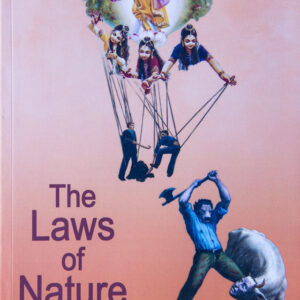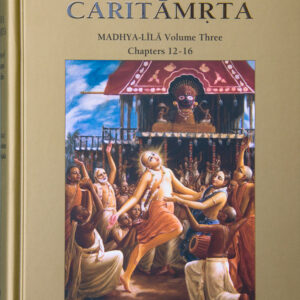Description
CHAPTER ONE
Learning the Science of the Soul
Seeing the Aim of Human Life
“According to Vedic civilization, the perfection of life is to realize one’s relationship with Kṛṣṇa, or God.… All living entities are parts and parcels of God. The parts are meant for serving the whole, just as the legs, hands, fingers, and ears are meant for serving the total body. We living entities, being parts and parcels of God, are duty-bound to serve Him.”
This very important Kṛṣṇa consciousness movement is meant to save human society from spiritual death. At present human society is being misled by leaders who are blind, for they do not know the aim and objective of human life, which is self-realization and the reestablishment of our lost relationship with the Supreme Personality of Godhead. That is the missing point. The Kṛṣṇa consciousness movement is trying to enlighten human society in this important matter.
According to Vedic civilization, the perfection of life is to realize one’s relationship with Kṛṣṇa, or God. In the Bhagavad-gītā, which is accepted by all authorities in transcendental science as the basis of all Vedic knowledge, we understand that not only human beings but all living entities are parts and parcels of God. The parts are meant for serving the whole, just as the legs, hands, fingers, and ears are meant for serving the total body. We living entities, being parts and parcels of God, are duty-bound to serve Him.
Actually our position is that we are always rendering service to someone, either to our family, country, or society. If we have no one to serve, sometimes we keep a pet cat or dog and render service to it. All these factors prove that we are constitutionally meant to render service, yet in spite of serving to the best of our ability, we are not satisfied. Nor is the person to whom we are rendering that service satisfied. On the material platform, everyone is frustrated. The reason for this is that the service being rendered is not properly directed. For example, if we want to render service to a tree, we must water the root. If we pour water on the leaves, branches, and twigs, there is little benefit. If the Supreme Personality of Godhead is served, all other parts and parcels will be automatically satisfied. Consequently all welfare activities as well as service to society, family, and nation are realized by serving the Supreme Personality of Godhead.
It is the duty of every human being to understand his constitutional position with God and to act accordingly. If this is possible, then our lives become successful. Sometimes, however, we feel challenging and say, “There is no God,” or “I am God,” or even, “I don’t care for God.” But in actuality this challenging spirit will not save us. God is there, and we can see Him at every moment. If we refuse to see God in our life, then He will be present before us as cruel death. If we do not choose to see Him in one feature, we will see Him in another. There are different features of the Supreme Personality of Godhead because He is the original root of the entire cosmic manifestation. In one sense, it is not possible for us to escape Him.
This Kṛṣṇa consciousness movement is not blind religious fanaticism, nor is it a revolt by some recent upstart; rather, it is an authorized, scientific approach to the matter of our eternal necessity in relation with the Absolute Personality of Godhead, the Supreme Enjoyer. Kṛṣṇa consciousness simply deals with our eternal relationship with Him and the process of discharging our relative duties to Him. Thus Kṛṣṇa consciousness enables us to achieve the highest perfection of life attainable in the present human form of existence.
We must always remember that this particular form of human life is attained after an evolution of many millions of years in the cycle of transmigration of the spirit soul. In this particular form of life, the economic question is more easily solved than in the lower, animal forms. There are swine, dogs, camels, asses, and so on, whose economic necessities are just as important as ours, but the economic questions of these animals and others are solved under primitive conditions, whereas the human being is given all the facilities for leading a comfortable life by the laws of nature.
Why is a man given a better chance to live than swine or other animals? Why is a highly posted government officer given better facilities for a comfortable life than an ordinary clerk? The answer is very simple: the important officer has to discharge duties of a more responsible nature than those of an ordinary clerk. Similarly, the human being has to discharge higher duties than the animals, who are always busy with filling their hungry stomachs. But by the laws of nature, the modern animalistic standard of civilization has only increased the problems of filling the stomach. When we approach some of these polished animals for spiritual life, they say that they only want to work for the satisfaction of their stomachs and that there is no necessity of inquiring about the Godhead. Yet despite their eagerness to work hard, there is always the question of unemployment and so many other impediments incurred by the laws of nature. Despite this, they still denounce the necessity of acknowledging the Godhead.
We are given this human form of life not just to work hard like the swine or dog, but to attain the highest perfection of life. If we do not want that perfection, then we will have to work very hard, for we will be forced to by the laws of nature. In the closing days of Kali-yuga (this present age) men will have to work hard like asses for only a scrap of bread. This process has already begun, and every year the necessity for harder work for lesser wages will increase. Yet human beings are not meant to work hard like animals, and if a man fails to discharge his duties as a human being, he is forced to transmigrate to the lower species of life by the laws of nature. The Bhagavad-gītā very vividly describes how a spirit soul, by the laws of nature, takes his birth and gets a suitable body and sense organs for enjoying matter in the material world.








Reviews
There are no reviews yet.